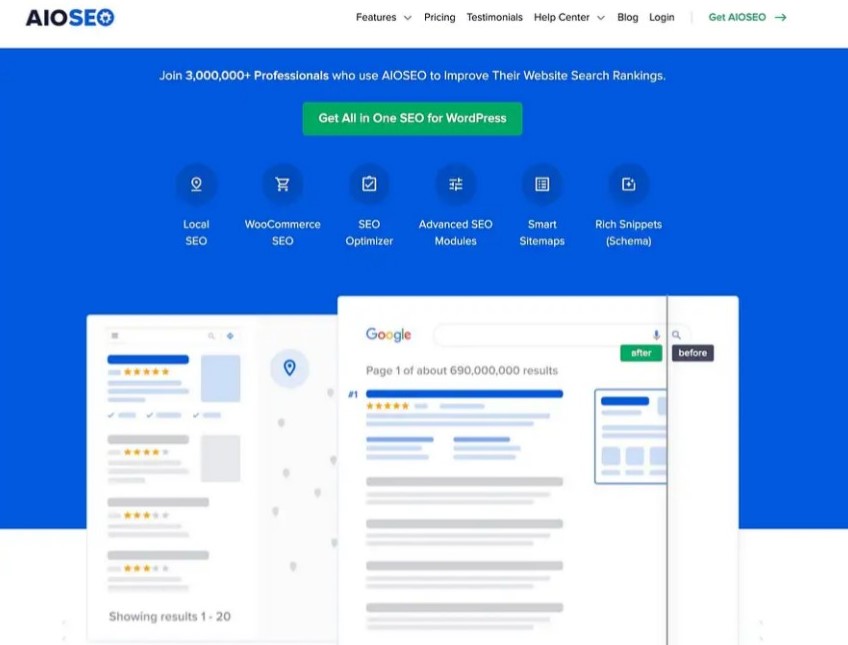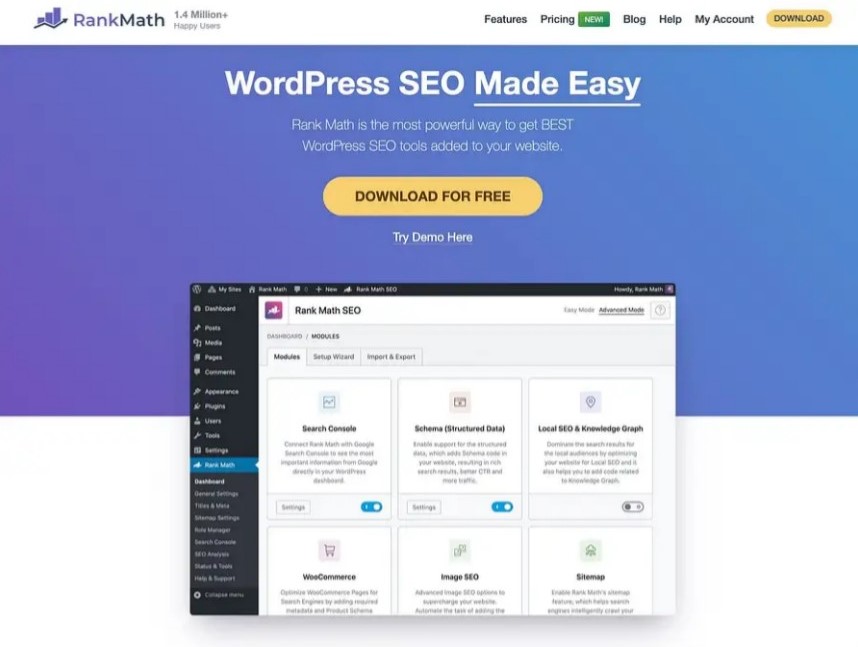If you’re running a website, you’re probably aware of the importance of optimizing your website for search engines. One of the best ways to do this is by using an SEO plugin. In this article, we’ll compare three popular SEO plugins – All in One SEO, Yoast, and Rank Math – and help you decide which one is the best for your website.

Introduction
In the modern era of technology and digital communication, it has become imperative for businesses or individuals to have an online presence in the form of a website. However, creating a website is just the first step. To ensure that your website is visible to potential customers or visitors, it’s important to optimize it for search engines. This is where SEO plugins come in. SEO plugins help you optimize your website for search engines by providing features such as keyword optimization, content analysis, and more. In this article, we’ll compare three popular SEO plugins: All in One SEO, Yoast, and Rank Math, and help you decide which one is the best for your website.
What is an SEO plugin?
An SEO plugin is a software program that integrates with your website and helps optimize it for search engines. It offers features like keyword optimization, content analysis, and meta tag optimization that make it easier to rank higher on search engine result pages (SERPs) and drive more organic traffic to your website.
All in One SEO
In this section, we’ll discuss the features of All in One SEO, including its user interface, keyword optimization, and content analysis. All in One SEO is a popular WordPress plugin that helps website owners optimize their website for search engines. All in One SEO provides a range of features that can be beneficial for website optimization. These features include the generation of an XML sitemap, integration with Google Analytics, and integration with social media platforms. The plugin also allows you to customize meta tags, titles, and descriptions for each page of your website. All in One SEO is user-friendly and has both free and paid versions available. It is a widely used SEO plugin and has been around for over a decade, making it a trusted choice for many website owners.

User Interface
We’ll describe the user interface of All in One SEO and explain how it’s different from other SEO plugins. The user interface (UI) of an SEO plugin refers to the visual design and layout of the plugin that users interact with. A good UI should be intuitive, easy to use, and visually appealing. It should also provide users with all the necessary information and tools to optimize their website for search engines. The UI of an SEO plugin should include features like a dashboard where users can access and manage their settings, keyword research tools, and on-page optimization suggestions. A well-designed UI can make a significant difference in the user experience and ultimately the effectiveness of the SEO plugin.
Keyword Optimization
We’ll explain how All in One SEO helps you optimize your website for keywords and why it’s important. Keyword optimization is the process of researching and selecting specific keywords that are relevant to your website and incorporating them into your content to improve your website’s visibility in search engine results pages (SERPs). The goal of keyword optimization is to make it easier for search engines to understand what your website is about and to show it to users who are searching for relevant information. Keyword optimization involves researching popular search terms, analyzing their relevance to your website, and using them strategically in your content, meta tags, and other on-page elements. It’s important to use keywords naturally and avoid “keyword stuffing,” which is the practice of using too many keywords in an attempt to manipulate search engine rankings.
Content Analysis
We’ll describe how All in One SEO analyzes your content and provides recommendations for optimization. Content analysis is a feature of SEO plugins that helps website owners optimize their content for search engines. It involves analyzing the content of a webpage and making suggestions for improvement to help it rank higher in search engine results pages (SERPs). Content analysis typically involves evaluating factors like the length of the content, the use of keywords, and the overall readability and organization of the content. SEO plugins that offer content analysis may provide suggestions for improving these factors, such as suggesting the use of more relevant keywords or improving the formatting of the content to make it easier to read. Content analysis is an important aspect of SEO because search engines value high-quality, relevant content and tend to rank websites with well-optimized content higher in search results.
Yoast
In this section, we’ll discuss the features of Yoast, including its user interface, keyword optimization, and content analysis. Yoast is a popular SEO plugin for WordPress that helps website owners optimize their website for search engines. It offers features like XML sitemap generation, on-page optimization suggestions, and social media integration. One of the standout features of Yoast is its content analysis tool, which provides detailed feedback on the quality of your content and suggestions for improvement. Yoast also includes a built-in tool for managing and optimizing your website’s meta tags and titles, which are important factors in search engine ranking. It has both free and paid versions available, and its user-friendly interface makes it a popular choice for website owners of all skill levels.

User Interface
We’ll describe the user interface of Yoast and explain how it’s different from other SEO plugins. The user interface (UI) of Yoast is designed to be simple and user-friendly, making it easy for website owners to optimize their website for search engines. Yoast’s UI is organized into sections, including a dashboard where users can access and manage their settings, and a content analysis section that provides detailed feedback on the quality of their content. Yoast also offers a “Snippet Preview” feature, which allows users to see how their page will appear in search engine results pages (SERPs) and make adjustments to their meta tags and titles accordingly.
Compared to other SEO plugins, Yoast’s UI is known for being very intuitive and easy to navigate, even for users who are new to SEO. The plugin’s content analysis tool is particularly useful, as it provides actionable suggestions for improving the quality and relevance of website content. Overall, Yoast’s user interface is designed to streamline the SEO process and help website owners optimize their website quickly and effectively.
Keyword Optimization
We’ll explain how Yoast helps you optimize your website for keywords and why it’s important. Yoast provides a range of features to help website owners optimize their website for keywords, which are important for improving search engine rankings. One of the key ways Yoast helps with keyword optimization is by analyzing the content on a webpage and suggesting relevant keywords to use. Yoast’s content analysis tool evaluates the focus keyword, which is the main keyword or phrase that a webpage is targeting, and provides suggestions for using it more effectively.
In addition to suggesting keywords, Yoast also provides a tool for optimizing meta tags and titles, which are important on-page factors that search engines use to understand what a webpage is about. By including relevant keywords in meta tags and titles, website owners can improve their website’s visibility in search engine results pages (SERPs) and attract more organic traffic.
Overall, keyword optimization is important for improving the visibility and search engine rankings of a website. Yoast’s keyword optimization features make it easier for website owners to target relevant keywords and improve the overall quality and relevance of their content.
Content Analysis
We’ll describe how Yoast analyzes your content and provides recommendations for optimization. Yoast’s content analysis tool is a powerful feature that helps website owners optimize their content for search engines. When a user enters a focus keyword, Yoast analyzes the content on the page and provides recommendations for optimization based on best practices for on-page SEO.
One of the key elements that Yoast’s content analysis tool evaluates is keyword density, which refers to the number of times a target keyword appears on a page. Yoast recommends a keyword density range of 0.5-2.5%, which helps ensure that the keyword is used frequently enough to be recognized by search engines without being overused and flagged as spam.
Yoast also evaluates the placement of keywords on the page, and recommends using them in key locations such as headings, subheadings, and the first paragraph of content. The plugin also provides feedback on the length of content, the use of internal and external links, and other factors that can impact the quality and relevance of content for search engines.
Overall, Yoast’s content analysis tool provides valuable recommendations for optimizing content to improve its visibility and search engine rankings. By following these recommendations, website owners can ensure that their content is optimized for search engines and is more likely to attract organic traffic.
Rank Math
In this section, we’ll discuss the features of Rank Math, including its user interface, keyword optimization, and content analysis. Rank Math is a relatively new SEO plugin that has gained popularity among website owners and SEO professionals. It offers a range of features to help improve your website’s search engine optimization, including:

User Interface
We’ll describe the user interface of Rank Math and explain how it’s different from other SEO plugins. Rank Math’s user interface is user-friendly and easy to navigate, making it simple for users of all levels of expertise to use. The plugin provides a clean and intuitive dashboard that allows you to easily access all of its features.
Keyword Optimization
We’ll explain how Rank Math helps you optimize your website for keywords and why it’s important. Rank Math provides advanced keyword optimization features that help website owners target relevant keywords and improve their search engine rankings. The plugin suggests focus keywords for each page based on the content, and provides detailed analysis and feedback on keyword density, placement, and usage
Content Analysis
We’ll describe how Rank Math analyzes your content and provides recommendations for optimization. Rank Math’s content analysis feature analyzes your content and provides recommendations for optimization. It checks for things like keyword density, length of the content, readability, and other factors that can impact your website’s search engine rankings.
- Schema Markup: Rank Math allows you to easily add schema markup to your website, which can help improve your website’s visibility in search engine results. Schema markup provides search engines with additional information about your website’s content, making it easier for them to understand and rank your content.
- Integration with Google Search Console: Rank Math integrates with Google Search Console, allowing you to easily view your website’s search engine performance and analytics data. This data can be used to further optimize your website’s SEO strategy.
Comparison
In this section, we’ll compare the features of All in One SEO, Yoast, and Rank Math and help you decide which one is the best for your website.
When it comes to choosing between All in One SEO, Yoast, and Rank Math, it can be difficult to determine which plugin is best for your website. To help you make a decision, let’s compare the features of each plugin.
- User Interface: All three plugins have user-friendly interfaces that are easy to navigate. However, the interface of Yoast is slightly more intuitive and visually appealing than the other two.
- Keyword Optimization: All three plugins offer keyword optimization tools to help improve your website’s SEO. However, Rank Math provides more advanced keyword optimization features, such as automatic keyword suggestions and a more comprehensive analysis of keyword usage.
- Content Analysis: All three plugins offer content analysis tools to help optimize your website’s content. However, Yoast provides the most comprehensive analysis, including checks for things like sentence length and use of transition words.
- Schema Markup: Both Yoast and Rank Math offer schema markup tools, while All in One SEO does not. However, Rank Math’s schema markup tools are more advanced and offer a wider range of schema types.
- Integration with Google Search Console: All three plugins integrate with Google Search Console, allowing you to easily access your website’s performance data. However, Rank Math provides more detailed performance data and analytics.
Based on these comparisons, it’s clear that each plugin has its own strengths and weaknesses. If you’re looking for a user-friendly interface and comprehensive content analysis, Yoast may be the best choice for you. If you’re looking for advanced keyword optimization features and schema markup tools, Rank Math is the way to go. Finally, if you’re looking for a basic SEO plugin with standard optimization features, All in One SEO may be the best choice. Ultimately, the best SEO plugin for your website depends on your individual needs and preferences.
User Interface
We’ll compare the user interfaces of the three plugins and explain which one is the most user-friendly. Rank Math’s user interface is clean and user-friendly, with a dashboard that provides a comprehensive overview of your website’s SEO performance. Users can quickly access important features such as keyword optimization, content analysis, and site map creation from the dashboard.
Keyword Optimization
We’ll compare the keyword optimization features of the three plugins and explain which one is the most effective. Rank Math provides advanced keyword optimization features that help website owners target relevant keywords and improve their search engine rankings. The plugin suggests focus keywords for each page based on the content, and provides detailed analysis and feedback on keyword density, placement, and usage.
Content Analysis
We’ll compare the content analysis features of the three plugins and explain which one provides the most useful recommendations. Rank Math’s content analysis tool is highly advanced, providing detailed feedback on a wide range of factors that impact on-page SEO. This includes recommendations for optimizing headings, images, internal and external links, and more. The plugin also provides recommendations for improving the overall quality and relevance of content, including suggestions for adding more detail, using more descriptive language, and more.
Conclusion
In this section, we’ll summarize the article and provide our recommendation for the best SEO plugin. Overall, Rank Math is a comprehensive SEO plugin that provides a range of powerful features to help website owners improve their search engine rankings. Whether you’re a beginner or an experienced SEO professional, Rank Math has everything you need to optimize your website for search engines and attract more organic traffic.
FAQs
-
- Is it necessary to use an SEO plugin on my website? While it’s not mandatory to use an SEO plugin on your website, it’s highly recommended as it can help improve your website’s visibility and search engine rankings. SEO plugins provide a range of features that help optimize your content for search engines, making it easier for users to find your website.
- Can I use more than one SEO plugin on my website? It’s not recommended to use more than one SEO plugin on your website as they can conflict with each other and cause errors. Additionally, having multiple plugins can slow down your website’s performance.
- Does using an SEO plugin guarantee higher rankings on search engines? No, using an SEO plugin doesn’t guarantee higher rankings on search engines. While SEO plugins provide valuable optimization tools, they’re just one aspect of a successful SEO strategy. To improve your website’s rankings, you’ll also need to focus on creating high-quality content, building quality backlinks, and providing a good user experience.
- Can I use All in One SEO, Yoast, and Rank Math together? It’s not recommended to use multiple SEO plugins at the same time, as they can cause conflicts and errors. It’s best to choose one plugin that meets your needs and stick with it.
- Are there any free alternatives to these SEO plugins? Yes, there are several free alternatives to All in One SEO, Yoast, and Rank Math, such as The SEO Framework, SEOPress, and Jetpack. While these plugins may not have all the features of the premium plugins, they can still provide valuable optimization tools to help improve your website’s search engine rankings.
In conclusion, choosing the best SEO plugin for your website is an important decision that can have a significant impact on your search engine rankings. All in One SEO, Yoast, and Rank Math are all great options, but the best one for you depends on your specific needs and preferences. We hope this article has helped you make an informed decision and optimize your website for search engines.



